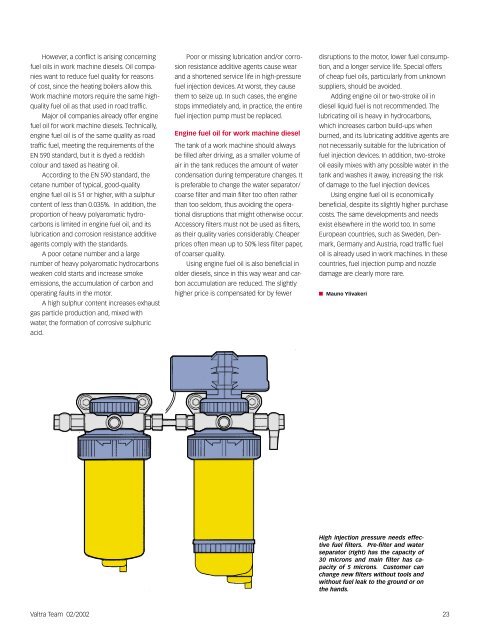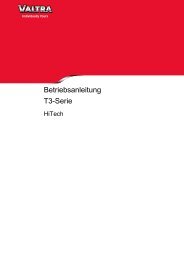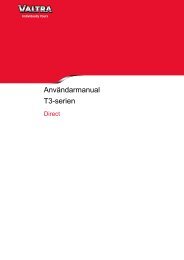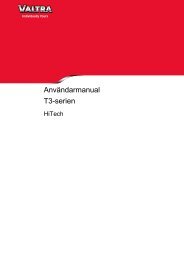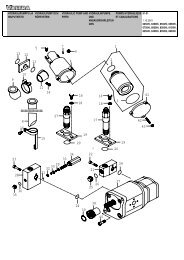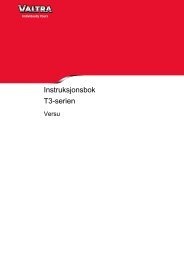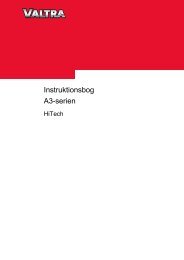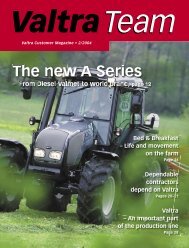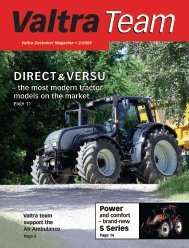New T series - Valtra
New T series - Valtra
New T series - Valtra
- TAGS
- valtra
- www.valtra.com
Create successful ePaper yourself
Turn your PDF publications into a flip-book with our unique Google optimized e-Paper software.
However, a confl ict is arising concerning<br />
fuel oils in work machine diesels. Oil companies<br />
want to reduce fuel quality for reasons<br />
of cost, since the heating boilers allow this.<br />
Work machine motors require the same highquality<br />
fuel oil as that used in road traffi c.<br />
Major oil companies already offer engine<br />
fuel oil for work machine diesels. Technically,<br />
engine fuel oil is of the same quality as road<br />
traffi c fuel, meeting the requirements of the<br />
EN 590 standard, but it is dyed a reddish<br />
colour and taxed as heating oil.<br />
According to the EN 590 standard, the<br />
cetane number of typical, good-quality<br />
engine fuel oil is 51 or higher, with a sulphur<br />
content of less than 0.035%. In addition, the<br />
proportion of heavy polyaromatic hydrocarbons<br />
is limited in engine fuel oil, and its<br />
lubrication and corrosion resistance additive<br />
agents comply with the standards.<br />
A poor cetane number and a large<br />
number of heavy polyaromatic hydrocarbons<br />
weaken cold starts and increase smoke<br />
emissions, the accumulation of carbon and<br />
operating faults in the motor.<br />
A high sulphur content increases exhaust<br />
gas particle production and, mixed with<br />
water, the formation of corrosive sulphuric<br />
acid.<br />
Poor or missing lubrication and/or corrosion<br />
resistance additive agents cause wear<br />
and a shortened service life in high-pressure<br />
fuel injection devices. At worst, they cause<br />
them to seize up. In such cases, the engine<br />
stops immediately and, in practice, the entire<br />
fuel injection pump must be replaced.<br />
Engine fuel oil for work machine diesel<br />
The tank of a work machine should always<br />
be fi lled after driving, as a smaller volume of<br />
air in the tank reduces the amount of water<br />
condensation during temperature changes. It<br />
is preferable to change the water separator/<br />
coarse fi lter and main fi lter too often rather<br />
than too seldom, thus avoiding the operational<br />
disruptions that might otherwise occur.<br />
Accessory fi lters must not be used as fi lters,<br />
as their quality varies considerably. Cheaper<br />
prices often mean up to 50% less fi lter paper,<br />
of coarser quality.<br />
Using engine fuel oil is also benefi cial in<br />
older diesels, since in this way wear and carbon<br />
accumulation are reduced. The slightly<br />
higher price is compensated for by fewer<br />
disruptions to the motor, lower fuel consumption,<br />
and a longer service life. Special offers<br />
of cheap fuel oils, particularly from unknown<br />
suppliers, should be avoided.<br />
Adding engine oil or two-stroke oil in<br />
diesel liquid fuel is not recommended. The<br />
lubricating oil is heavy in hydrocarbons,<br />
which increases carbon build-ups when<br />
burned, and its lubricating additive agents are<br />
not necessarily suitable for the lubrication of<br />
fuel injection devices. In addition, two-stroke<br />
oil easily mixes with any possible water in the<br />
tank and washes it away, increasing the risk<br />
of damage to the fuel injection devices.<br />
Using engine fuel oil is economically<br />
benefi cial, despite its slightly higher purchase<br />
costs. The same developments and needs<br />
exist elsewhere in the world too. In some<br />
European countries, such as Sweden, Denmark,<br />
Germany and Austria, road traffi c fuel<br />
oil is already used in work machines. In these<br />
countries, fuel injection pump and nozzle<br />
damage are clearly more rare.<br />
Mauno Ylivakeri<br />
High injection pressure needs effective<br />
fuel fi lters. Pre-fi lter and water<br />
separator (right) has the capacity of<br />
30 microns and main fi lter has capacity<br />
of 5 microns. Customer can<br />
change new fi lters without tools and<br />
without fuel leak to the ground or on<br />
the hands.<br />
<strong>Valtra</strong> Team 02/2002 23


